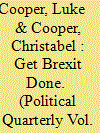| Srl | Item |
| 1 |
ID:
176074


|
|
|
|
|
| Summary/Abstract |
This article analyses the successful Conservative election campaign of 2019 and how it took advantage of a fractured political and economic landscape. It reviews the unique circumstances around the 2019 election and the ‘surprising death’ of a no‐deal Brexit. We then analyse the divergent political communication strategies in the 2017 and 2019 Conservative campaigns showing how the latter was much more coherent and politically unorthodox. Drawing on socioeconomic, demographic and British Election Study data, we argue that Boris Johnson’s messaging was carefully tailored towards the demands of voters in the ‘red wall’ seats. Conservative success was built around an appeal to voters in these economically depressed ‘geographies of discontent’. But while tremendously successful, the coalition this created is potentially fragile. An unconventional, ‘leftish’ Conservative campaign built a new, diverse bloc of voters. It includes a number of left‐wingers expecting change alongside traditional Conservative supporters, and will be hard to keep together given the economic turbulence ahead.
|
|
|
|
|
|
|
|
|
|
|
|
|
|
|
|
| 2 |
ID:
159984


|
|
|
|
|
| Summary/Abstract |
This article draws on some findings from research which investigated penal voluntary sector adaptation to the mixed market in criminal justice services. The article firstly reprises the main trends for aligning state relationships with the voluntary sector from the 1980s to the present. We then outline some findings about adaptive experiences, situations and practices of the voluntary sector in criminal justice resettlement in the light of considerable upheaval. The research found that service providing voluntary sector organisations (VSOs) either outwardly comply with, or, in a minority of cases, actively embrace, competitive marketised models of service delivery. Secondly, the sector has normalised commercial approaches to organisational efficiency as well as aligned with bureaucratic practices common to the statutory sector. Despite charges that they are effectively co‐opted by both state and market interests, many have reported conflicts between prioritising long‐term financial viability with their founding ‘ethos and values’. We conclude that while many VSOs have successfully adjusted to market and bureaucratic norms, aspects of that repositioning have been at a cost to their traditions of relative autonomy, localism and distinctiveness, to the possible detriment of a vigorous civil society.
|
|
|
|
|
|
|
|
|
|
|
|
|
|
|
|